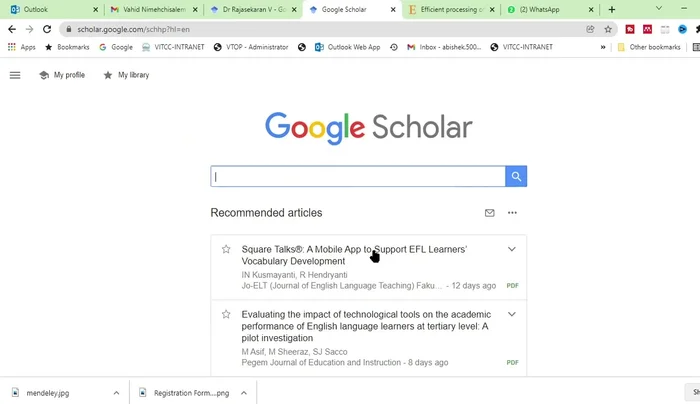Staying current in your research field is crucial, but sifting through countless publications can be overwhelming. Google Scholar Alerts offer a streamlined solution. This guide provides a step-by-step walkthrough on setting up personalized alerts, ensuring you receive timely notifications on new research matching your specific interests. Learn how to refine your searches, manage your alerts, and maximize this powerful tool to stay ahead in your area of expertise.
Step-by-Step Instructions
-
Access Google Scholar
- scholar.google.com

Access Google Scholar -
Prepare your profile
- Ensure you have a Google Scholar profile created.

Prepare your profile -
Navigate to Alerts
- Click the three-line menu icon.
- Select 'Alerts'.


Navigate to Alerts -
Create the Alert
- Click 'Create alert'.
- Enter your search query (topic or author). For best results, check the number of results before creating the alert to ensure relevance.
- Choose 'Top results' for more relevant alerts.
- Click 'Create alert'.




Create the Alert
Tips
- Create alerts for both specific topics and key authors in your field to maximize your coverage.
- Check your email regularly for notifications.
- Cancel any alerts that are no longer relevant to save time and reduce email clutter.
- Specify your preferred email address for receiving alerts.
Common Mistakes to Avoid
1. Using too broad or too narrow keywords
Reason: Broad keywords result in too many irrelevant alerts, while narrow keywords might miss important papers. Finding the right balance is crucial for effective monitoring.
Solution: Experiment with different keyword combinations and Boolean operators (AND, OR, NOT) to refine your search.
2. Ignoring alert frequency and delivery settings
Reason: Receiving alerts too frequently can lead to information overload, while infrequent alerts might cause you to miss crucial updates. The delivery method also influences how easily you notice alerts.
Solution: Adjust the alert frequency to a manageable level and choose a delivery method (email, RSS) that best suits your workflow.
FAQs
How often will I receive alerts?
You can customize the frequency of your alerts. Options include as-it-happens, daily, or weekly. Choose the option that best suits your workflow.
Can I create alerts for multiple search terms?
Yes, you can create separate alerts for different keywords or combinations of keywords. This allows you to monitor various aspects of your research field simultaneously.
What if I want to stop receiving alerts?
You can easily manage or delete your alerts at any time. Go to your Google Scholar settings, find the 'Alerts' section, and you'll have options to edit or delete existing alerts.








